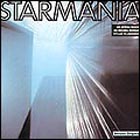Canadian Masters and their Works
Luc Plamondon, Michel Berger – Starmania – 1978 
Article by Richard Baillargeon
 The rock opera Starmania occurred at a crucial time, both for its author and the musical genre as a whole. By the mid-seventies, Luc Plamondon had already a decade’s worth of hit songs under his belt, co-written with André Gagnon, François Cousineau, Michel Robidoux among others. Until then he was lending his talents to the best pop voices in Quebec, among them Diane Dufresne, Renée Claude and Pauline Julien, but also a few French singers notably Julien Clerc and Nicole Croisille. But Starmania marks a turning point for the lyricist, one where he would take on more ambitious projects. When he began this project, the concept of rock operas, introduced in the sixties via Hair, Tommy and Jesus-Christ Superstar, had had its day. In 1973, Plamondon, in conjunction with composer François Cousineau and singer Diane Dufresne, first tested the waters with Opéra-Cirque, a work which got a polite but modest reception. In 1975, all changed for him when French composer Michel Berger came knocking at his door with the idea of working on a kind of futuristic allegory. After two years spent in the incubator, interrupted by their own respective projects, the co-authors’ brainchild first hit the market as a two LP set, with a stage premiere in Paris a year later, in 1979, and another one in Montreal the next year.
The rock opera Starmania occurred at a crucial time, both for its author and the musical genre as a whole. By the mid-seventies, Luc Plamondon had already a decade’s worth of hit songs under his belt, co-written with André Gagnon, François Cousineau, Michel Robidoux among others. Until then he was lending his talents to the best pop voices in Quebec, among them Diane Dufresne, Renée Claude and Pauline Julien, but also a few French singers notably Julien Clerc and Nicole Croisille. But Starmania marks a turning point for the lyricist, one where he would take on more ambitious projects. When he began this project, the concept of rock operas, introduced in the sixties via Hair, Tommy and Jesus-Christ Superstar, had had its day. In 1973, Plamondon, in conjunction with composer François Cousineau and singer Diane Dufresne, first tested the waters with Opéra-Cirque, a work which got a polite but modest reception. In 1975, all changed for him when French composer Michel Berger came knocking at his door with the idea of working on a kind of futuristic allegory. After two years spent in the incubator, interrupted by their own respective projects, the co-authors’ brainchild first hit the market as a two LP set, with a stage premiere in Paris a year later, in 1979, and another one in Montreal the next year.
At the end of the decade, the beat and hippie generations were becoming disillusioned in the wake of the Watergate affair and the Vietnam debacle. Elsewhere, England was poised to elect Margaret Thatcher, a.k.a. the Iron Lady, and a sizeable, if not very visible chunk of its country’s youth were brandishing slogans like “No Future” and sporting a punk garb. While Plamondon and Berger did not draw on this new style or its ideology, they were certainly in tune with the gloom it expressed. Indeed, their work only begins to anticipate the dreariness of a world where men are increasingly losing control over their lives. Some try to sublimate this in their own power trips, others cloak themselves under layers of glitter, as is the case in Zero Janvier’s number “Le blues du businessman” or Stella Spotlight’s “Les adieux d’un sex-symbol.” The characters are highly concerned about the future and what life will be like in the year 2000; songs like “Un garçon pas comme les autres” delve into issues of identity; “Monopolis” expresses the feelings or resignation in the face of daily drudgery; la “Complainte de la serveuse automate” deals with the encroachment of machines and robots and “Ce soir on danse à Naziland” delves into carefree hedonism. In Starmania, Plamondon used powerful images and symbols which grabbed the attention of the public.
The star-studded original cast of the rock opera was a vaulting ground for many Québécois and French singers, most notably Claude Dubois, subbed by Étienne Chicot for the stage version, Diane Dufresne, France Gall, Fabienne Thibeault, Nanette Workman, Daniel Balavoine. In its first two decades, some five million spectators attended the show, with further adaptations in German, Spanish and English, the latter one presented in London. In fact, no less than Time Rice and Andrew Lloyd Weber spawned their own version of it (“Tycoon”), but the 1992 adaptation did not fare well. In September 2006, it was made known in Montreal’s daily La Presse that a French film company would make a screen version of it.
The trend that Starmania started led to other pop operas, both in Quebec and France, i.e. Les Misérables, Roméo et Juliette, Les Dix commandements. Moreover, the opera attracted the attention of fans of musical comedies while breathing new life into that genre. In the ensuing years, Plamondon has co-written other rock operas: La légende de Jimmy (1989), Sand et les Romantiques (1991) and the noteworthy Notre-Dame de Paris. Yet, Starmania is still his masterwork, a musical signpost within the French-speaking world.

The 1978 recording also produced a series of hits while topping off the charts for three solid months. Of these, the “Blues du businessman” sung by Claude Dubois still stands out from the crowd. Yet, it is the original version on record as Dubois never took part in the stage production. But what is also striking is the fact that it is one of Dubois’ best known numbers ever, if not the most, yet one of a handful he did not write himself. However, he managed to brand his own personality onto the performance of the song. He did it through his delivery with vocal interjections like his (“falouida, falouido”) and with the use of pitch and timbre when he sings “Pouvoir être un anarchiste et vivre comme un millionaire.” In that song alone, Plamondon managed to summarize the grandness of the baby boomers’ dream and their ambitions.
The music leaves no one indifferent either, for it has all the trappings of a hit. Unfolding in a steady crescendo, it begins quietly with voice and acoustic guitar, building steadily towards an effective climax with the entrance of a vocal chorus and orchestra that culminates in the final line, “pouvoir dire pourquoi j'existe.” Instead of sticking to the alternating verse and refrain structure found in pop tunes, two opposing elements face off with one another here, the first delivered in a hushed tone and relating to more superficial things (“J'ai du succès dans mes affaires”), the other, more expressive in nature, and describing the hidden desire of the character, thus revealed in its punchline: “J’aurai voulu être un artiste.”
Plamondon’s writing is very much attuned to the spirit of the times. While he can tailor lyrics to measure for any singer, he prefers to create musical worlds of his own, in which each protagonist stems from his own vision of the world. Behind his trademark shades, Plamondon is a retiring individual for the most part, but he can also make himself heard loud and clear on issues that are dear to him, for example, copyrights.
Links
http://www.thecanadianencyclopedia.com/index.cfm?PgNm=TCE&Params=U1ARTU0003926